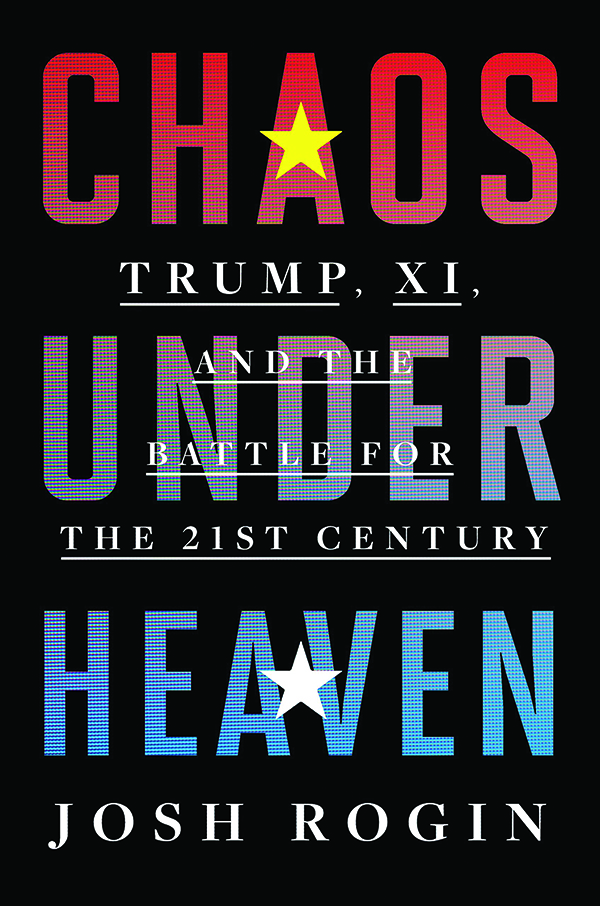After more than a year of a deadly pandemic, lockdowns, soaring violent crime, and a crisis of confidence in our institutions, it may seem odd to recommend a nonfiction book that reads like a horror story. Chaos Under Heaven, the debut book of Washington Post foreign policy columnist Josh Rogin, tells the definitive tale of how the Trump administration remade America’s relationship with the Chinese Communist Party, culminating, in its final chapter, with the outbreak of the coronavirus, which we readers see coming with all the inevitability of a slow-motion train wreck.
Chaos Under Heaven is not your stereotypical beach read. The occasional incompetence of the Trump administration — including its mixed messages on Taiwan and its failure to crack down on Jared Kushner’s and Ivanka Trump’s blatant conflicts of interest — and the general corruption of our own government will infuriate you, as will the firsthand accounts of Uyghurs surviving the genocidal persecution of the Chinese state. But after a year of misleading and downright false information about the pandemic from two presidential administrations, the public health apparatus, and the bulk of the media, Rogin’s book provides a refreshingly honest answer to the question on all of our minds: How did we get to the point in which China could force the world to a standstill?

Rogin’s answer, of course, is that the experiment in democratizing China through trade and cooperation has failed. Barack Obama’s administration was happy to ignore Beijing’s human rights abuses in exchange for cooperation on climate change solutions and the Iran deal. So sycophantic was the administration’s approach that then-Secretary of State John Kerry hosted a member of the Chinese Politburo at his Boston home “to build their personal ties.” It was a continuation of this weakness, and credulity, that the CCP was expecting from President Hillary Clinton. Then Donald Trump managed his shocking upset.
Rogin’s criticism, however, is not limited to Obama or Clinton. He argues that Trump fundamentally failed to understand his relationship with Chinese President Xi Jinping, betting that his personal rapport with Xi would help secure concessions from China on trade. But the reverse was also true: Beijing misunderstood Trump and his team. Rather than acquiesce to Trump’s superficial, initial trade demands in 2018, the CCP decided to play hardball, believing Trump’s motivations as a businessman would override the preferences of the China hawks waiting in the wings. As a result, an overconfident Beijing walked into the Trump administration’s “trap,” as one former White House official describes it to Rogin.
If the Chinese leadership had simply given Trump what he wanted — a basic trade deal that would have cracked down on China’s intellectual property theft and guaranteed Chinese purchases of some American goods — Rogin writes, they “would have stopped the [American] hardliners and hawks from succeeding in their plan to turn the government and U.S. foreign policy away from engagement and toward competition and pressure.” But the Chinese leadership, assuming that the United States wouldn’t dig its heels in for a fight, opted for a trade war, the result of which was to raise the costs and risks of doing business with China. As Rogin explains, “China now faces a situation where its industrial policy is under permanent attack and the tariffs [on its exports] have become a fact of life.”
Rogin also offers a refreshingly honest assessment of the Trump administration’s notoriously factional foreign policy team. He draws clear lines between bombastic and emotionally charged “superhawks,” such as Steve Bannon and, later, Peter Navarro, and “realist” anti-China neocons, such as Mike Pence. But he recognizes that the worst mistakes of the Trump White House came not from the occasionally clownish outbursts of the Bannonites but from the supposedly more responsible figures. In January 2020, for instance, the hawkish Deputy national security adviser Matt Pottinger, whom Rogin reveals to be one of the unsung heroes of Trump’s China policy, begged the administration to shut down travel from China in order to halt the spread of COVID-19, which he predicted would be “the single greatest national security crisis” of Trump’s presidency. It was then-Treasury Secretary Steven Mnuchin, a former Goldman Sachs banker and one of the “respectable” members of the White House, who warned Trump that a travel ban would tank markets and the airline industry. It’s the latter that Rogin rightly holds in contempt.
After all, as Rogin emphasizes, the palace intrigue that political reporters salivate over is meaningless compared to the larger story of how decades of U.S. engagement with China came to be perceived as an utter failure. It took a character as disruptive as Trump to pivot from the clubby relationship of the Clinton-Bush-Obama years to the openly adversarial one we have today, but Trump is out of office, and the Biden administration is unlikely to reverse course fully. And with Trump gone, figures like Pottinger, who saw the escalation coming and prepared for it, will have a role to play in the future.
The coronavirus seemed to be a black swan event at its start, but Rogin’s book suggests that we should have seen something like it coming. Rogin has done more than perhaps any other mainstream reporter to argue that the coronavirus probably leaked from a lab in Wuhan and to draw attention to the ways in which the U.S. public health establishment, including the National Institutes of Health and other government agencies, might be implicated in funding risky research practices that could have been the source of the pandemic. But whatever the origin of COVID-19, Chaos Under Heaven shows that America’s security, and safety, had been jeopardized by the CCP long before the pandemic finally drove that point home.
Tiana Lowe is a Washington Examiner commentary writer.
